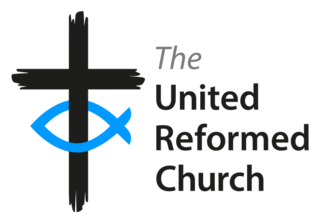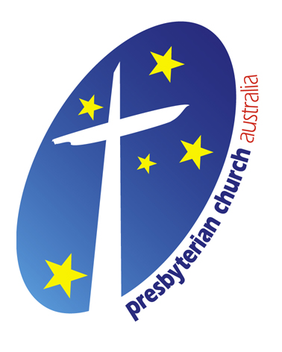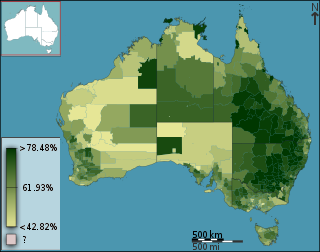Related Research Articles

The United Reformed Church (URC) is a Protestant Christian church in the United Kingdom. As of 2022 it has approximately 40,000 members in 1,284 congregations with 334 stipendiary ministers.

The Uniting Church in Australia (UCA) was founded on 22 June 1977, when most congregations of the Methodist Church of Australasia, about two-thirds of the Presbyterian Church of Australia and almost all the churches of the Congregational Union of Australia united under the Basis of Union. According to the church, it had 243,000 members in 2018. In the 2016 census, about 870,200 Australians identified with the church; in the 2011 census, the figure was 1,065,796. The UCA is Australia's third-largest Christian denomination, behind the Catholic and the Anglican Churches. There are around 2,000 UCA congregations, and 2001 National Church Life Survey (NCLS) research indicated that average weekly attendance was about 10 per cent of census figures.

The Catholic Church in Australia is part of the worldwide Catholic Church under the spiritual and administrative leadership of the Holy See. From origins as a suppressed, mainly Irish minority in early colonial times, the church has grown to be the largest Christian denomination in Australia, with a culturally diverse membership of around 5,075,907 people, representing about 19.9% of the overall population of Australia according to the 2021 ABS Census data.

Religion in the United Kingdom, and in the countries that preceded it, has been dominated for over 1,400 years by various forms of Christianity, replacing Romano-British religions, Celtic and Anglo-Saxon paganism as the primary religion. Religious affiliations of United Kingdom citizens are recorded by regular surveys, the four major ones being the national decennial census, the Labour Force Survey, the British Social Attitudes survey and the European Social Survey.

The Presbyterian Church of Australia (PCA) is the largest Presbyterian denomination in Australia.
Mission Australia is a national Christian charity that provides a range of community services throughout Australia. It has its roots in the Brisbane sector of The British and Foreign Bible Society’s sub-committee, The Colporteur Society (1869), and ‘’Sydney City Mission (1862), but was only officially established in 1996, bringing together a number of city missions across the country. The organisation specialises in the areas of homelessness and housing, families and children, early learning, youth, employment and skills, substance abuse, disability, mental health, and strengthening communities. Sharon Callister has been CEO since March 2022.

Christianity is the largest religion in Australia, though its share of total population has declined significantly over the past several decades. Section 116 of the Constitution of Australia of 1901 states, "The Commonwealth shall not make any law for establishing any religion, or for imposing any religious observance, or for prohibiting the free exercise of any religion, and no religious test shall be required as a qualification for any office or public trust under the Commonwealth."

Christianity is the largest religion in Australia, with a total of 43.9% of the nation-wide population identifying with a Christian denomination. The presence of Christianity in Australia coincided with the foundation of the first British colony at New South Wales in 1788.

The Australian Council of Social Service (ACOSS) is an Australian organisation that advocates for action to reduce poverty and inequality, and is the peak body for the community services sector in Australia. It was formed in 1956.
The Australian Christian Churches (ACC), formerly Assemblies of God in Australia, is a network of Pentecostal churches in Australia affiliated with the World Assemblies of God Fellowship, which is the largest Pentecostal denomination in the world.

As of the 2011 census, Christianity was the largest religion in Scotland, chosen by 53.8% of the Scottish population identifying when asked: "What religion, religious denomination or body do you belong to?" This represented a decline from the 2001 figure of 65.1%.

The Anglican Diocese of Tasmania includes the entire Tasmanian archipelago and is an extraprovincial diocese of the Anglican Church of Australia.

Religion in New Zealand encompasses a wide range of groups and beliefs. Almost half of New Zealanders stated they had no religion in the 2018 census and 6.7 percent made no declaration. However, Christianity remains the most common religion; 37.3 percent of the population at the 2018 census identified as Christian, with Anglicanism being the largest denomination. Around six percent of the population is affiliated with non-Christian religions. Hinduism is the second-most popular religion, claiming 2.7 percent of the population, and Sikhism is the fastest-growing faith.

Christianity is the most prevalent religion in the United States. Estimates from 2021 suggest that of the entire U.S. population about 63% is Christian. A plurality of Christian Americans are Protestant Christians, though there are also significant numbers of American Roman Catholics and other minority Christian denominations such as Latter-day Saints, Orthodox Christians and Oriental Orthodox Christians, and Jehovah's Witnesses. The United States has the largest Christian population in the world and, more specifically, the largest Protestant population in the world, with nearly 210 million Christians and, as of 2021, over 140 million people affiliated with Protestant churches, although other countries have higher percentages of Christians among their populations. The Public Religion Research Institute's "2020 Census of American Religion", carried out between 2014 and 2020, showed that 70% of Americans identified as Christian during this seven-year interval. In a 2020 survey by the Pew Research Center, 65% of adults in the United States identified themselves as Christians. They were 75% in 2015 70.6% in 2014, 78% in 2012, 81.6% in 2001, and 85% in 1990. About 62% of those polled claim to be members of a church congregation.

Atheism, agnosticism, scepticism, freethought, secular humanism or general irreligion are increasing in Australia. Post-war Australia has become a highly secularised country. Religion does not play a major role in the lives of much of the population.
The Christian Research Association (CRA) was founded in 1985 to study the Christian faith in Australia. Its work consists of major research projects which have focussed on overviews of research on spirituality and religion in relation to Australian culture, contract research for Christian organisations, including local reports based on Australian Census data, and support for other organisations in research that enhances the mission of the churches and the wellbeing of individuals and society in Australia.

Church attendance is a central religious practice for many Christians; some Christian denominations, such as the Catholic Church require church attendance on the Lord's Day (Sunday); the Westminster Confession of Faith is held by the Reformed Churches and teaches first-day Sabbatarianism, thus proclaiming the duty of public worship in keeping with the Ten Commandments. Similarly, The General Rules of the Methodist Church also requires "attending upon all the ordinances of God" including "the public worship of God". The Lutheran Christian theologian Balthasar Münter stated that church attendance is the "foundation for the Christian life" as "the Christian Bible and the sacraments provide the framework for the faith"; he also states that it is important for believers because it aids in the prevention of backsliding, as well as offers "the company of other believers". Until 1791, the government of the United Kingdom required attendance at church services of the Church of England at least twice a year.
Dorothy McRae-McMahon is a retired Australian Uniting Church minister and activist, formerly Minister at Pitt Street Uniting Church—known for its human rights work and local "street level" activism.
The decline of Christianity in the Western world is the decreasing Christian affiliation in the Western world. While most countries in the Western world were historically almost exclusively Christian, the post-World War II era has seen developed countries with modern, secular educational facilities shifting towards post-Christian, secular, globalized, multicultural and multifaith societies. While Christianity is currently the predominant religion in Latin America, Europe, Canada and the United States, the religion is declining in many of these areas, including Western Europe, North America, and Oceania. A decline in Christianity among countries in Latin America's Southern Cone has also contributed to a rise in irreligion in Latin America.

UnitingWorld is the international aid and partnerships agency of the Uniting Church in Australia, based in Sydney Australia.
References
- 1 2 3 4 "Sponsors and Partners". National Church Life Survey. Retrieved 19 June 2010.
- ↑ "Media Release: BaptistCare NSW & ACT join as sponsors of NCLS Research". NCLS Research. Retrieved 18 December 2018.
- ↑ "Regional Contacts". National Church Life Survey. Archived from the original on 21 February 2011. Retrieved 19 June 2010.
- ↑ "What We Do". National Church Life Survey. Retrieved 19 June 2010.
- 1 2 "National Church Life Survey 2001". National Church Life Survey. Archived from the original on 18 February 2017. Retrieved 19 June 2010.
- ↑ Morris, Linda (21 January 2008). "Spirit strongest in wheat and sheep country". The Sydney Morning Herald . Nine Entertainment Co. Retrieved 19 June 2010.
- ↑ "Wellbeing and Security 2003". National Church Life Survey. Retrieved 19 June 2010.
- ↑ "First Look Report 2001". National Church Life Survey. Archived from the original on 20 March 2017. Retrieved 19 June 2010.
- ↑ Gilchrist, Michael (April 2004). "National Church Life Survey: church-going declines further". AD 2000. Vol. 17, no. 3. p. 3. Archived from the original on 22 September 2010.
- ↑ "NCLS releases latest estimates of church attendance". National Church Life Survey. 28 February 2004. Retrieved 7 December 2012.
- ↑ Ruth Powell (20 November 2012). "OPINION: Churches' future depends on their followers". The Newcastle Herald . Australian Community Media . Retrieved 7 December 2012.